First report of powdery mildew of Aesculus hippocastanum caused by Erysiphe flexuosa in Turkey
E. Tozlu A and E. Demirci B CA Eastern Anatolia Agricultural Research Institute, 25090 Erzurum, Turkey.
B Department of Plant Protection, Faculty of Agriculture, Atatürk University, 25240 Erzurum, Turkey.
C Corresponding author. Email: drerkol@hotmail.com
Australasian Plant Disease Notes 5(1) 61-62 https://doi.org/10.1071/DN10022
Submitted: 17 February 2010 Accepted: 12 May 2010 Published: 7 June 2010
Abstract
Powdery mildew symptoms were observed on the leaves of horse chestnut (Aesculus hippocastanum) which is common in urban areas of Ordu province, Turkey. The pathogen was identified as Erysiphe flexuosa based on morphological characters. This is the first report of E. flexuosa on horse chestnut from Turkey.
Aesculus hippocastanum is a large deciduous tree, commonly known as horse chestnut. It is planted in parks and gardens in Ordu province, Turkey. In August 2009, leaves of A. hippocastanum showing typical symptoms of a powdery mildew were collected from trees in parks of Ordu (Fig. 1).
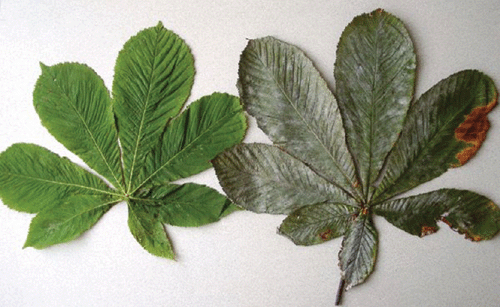
|
White mycelium and chasmothecia were present on both leaf surfaces, but chasmothecia were abundant on the lower surfaces of leaves. Chasmothecia were initially yellow or light brown and then turned black upon maturity (Fig. 2). They were globose or subglobose, 102–143 × 89–127 µm is size. Chasmothecia had two types of appendages: long ones terminating in circinate tips and short, bristle-like ones (Fig. 3). The long appendages measured 91–161 μm and the shorter ones measured 13–45 μm. Asci were several per chasmothecia, clavate, short-stalked and 52–64 × 28–38 µm (Fig. 4). Ascospores were ellipsoid and 15–29 × 9–16 µm (Fig. 5). Conidia were cylindrical, measuring 23–41 × 10–16 µm (Fig. 6). The pathogen was identified as Erysiphe flexuosa (Peck) U. Braun & S. Takamatsu based on its micro-morphology. A specimen was deposited in the Department of Plant Protection, Faculty of Agriculture, Atatürk University, Erzurum, Turkey.
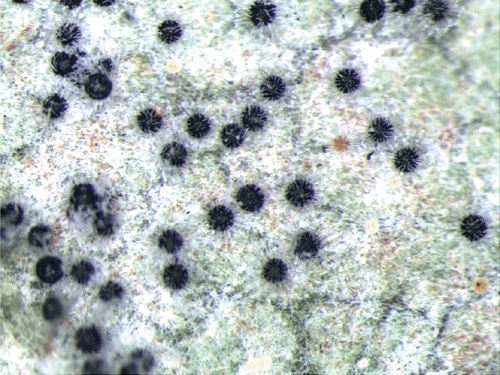
|
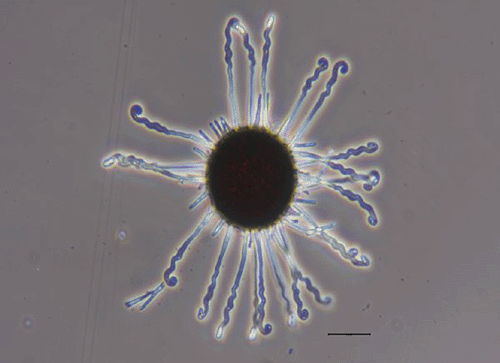
|
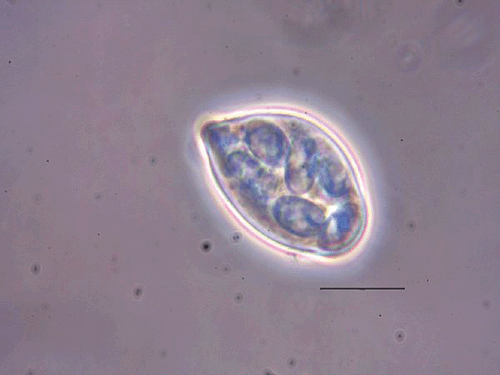
|
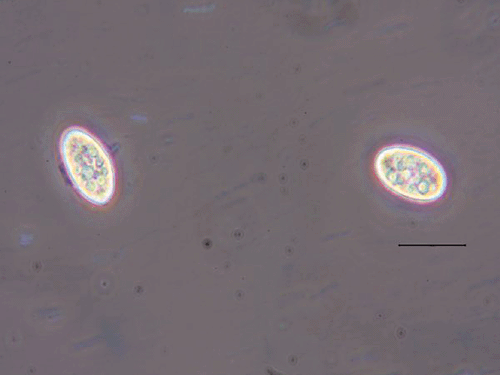
|
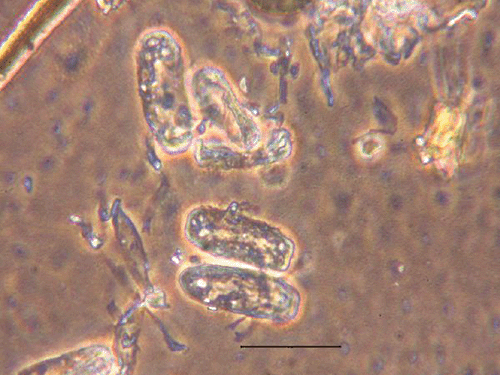
|
Erysiphe flexuosa is a North American powdery mildew which has recently spread to Europe. The first European record was published by Ale-Agha et al. (2000) from Germany. Furthermore, it has been reported on A. hippocastanum and other Aesculus spp. from Austria, Croatia, France, Poland, Slovakia, UK and Switzerland (Zimmermannová-Pastirčáková and Pastirčak 2002; Zimmermannová-Pastirčáková et al. 2002; Bolay 2005), in Hungary (Kiss et al. 2004), in Slovenia (Milevoj 2004), in Italy (Nali 2006), in Spain (Campelo et al. 2007) and in Bulgaria (Stoykov and Denchev 2008). To our knowledge, this is the first report of E. flexuosa on horse chestnut from Turkey.
Ale-Agha N,
Braun U,
Feige B, Jage H
(2000) A new powdery mildew disease on Aeculus spp. introduced in Europe. Cryptogamie Mycologie 21, 89–92.
| Crossref | GoogleScholarGoogle Scholar |

Bolay A
(2005) Les Oïdiums de Suisse (Erysiphacées). Cryptogamica Helvetica 20, 1–176.

Campelo MP,
Lorenzana A, Marcos MF
(2007) First report of horse chestnut powdery mildew caused by Erysiphe flexuosa in Castilla y León, Spain. Plant Disease 91, 1513.
| Crossref | GoogleScholarGoogle Scholar |

Kiss L,
Vajna L, Fischl G
(2004) Occurrence of Erysiphe flexuosa (syn.Uncinula flexuosa) on horse chestnut (Aesculus hippocastanum) in Hungary. Plant Pathology 53, 245.
| Crossref | GoogleScholarGoogle Scholar |

Milevoj L
(2004) The occurrence of some pests and diseases on horse chestnut, plane tree and Indian bean tree in urban areas of Slovenia. Acta Agriculturae Slovenica 83, 297–300.

Nali C
(2006) The horse chestnut powdery mildew caused by Erysiphe flexuosa (syn. Uncinula flexuosa) in Italy. Journal of Plant Pathology 88, S65.

Stoykov DY, Denchev CM
(2008)
Erysiphe flexuosa (Erysiphales) in Bulgaria. New records of fungi, fungus-like organisms, and slime moulds from Europe and Asia: 1–6. Mycologia Balcanica 5, 94–95.

Zimmermannová-Pastirčáková K, Pastirčak M
(2002)
Erysiphe flexuosa – a new species of powdery mildew for Slovakia. Biologia 57, 437–440.

Zimmermannová-Pastirčáková K,
Adamska I,
Błaszkowski J,
Bolay A, Braun U
(2002) Epidemic spread of Erysiphe flexuosa (North American powdery mildew of horse-chestnut) in Europe. Schlechtendalia 8, 39–45.



